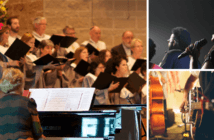Rosario Picardo says unused building space can be a goldmine of opportunity if a church has eyes to see how their space could be used creatively to reach the community and make ministry happen. A church’s property is one of its greatest assets.
How many times have you driven by a church building during the week and seen an empty parking lot? The pastor and some staff may be there, but the actual building remains largely unused throughout the week. A goldmine of opportunity is within the church’s reach, but one must have eyes to see in order to notice it. A church’s property is one of the greatest assets it has for its community. One way churches can use the resources in front of them is to creatively use their space.
Buildings can be turned into assets simply by getting rid of what is useless and making room for the new thing God wants to do in the space.
What spaces do you need to reclaim in your local church to make room for ministry to happen? What can be repurposed for the church or the community? Stewardship includes the care of buildings that have been entrusted to local congregations. Just because a building is large, old, and less energy-efficient than modern buildings doesn’t automatically make it a liability. On the other hand, if church buildings are treated like museums where people feel as if they can’t touch anything, they will not feel welcome. These buildings can be turned into assets simply by getting rid of what is useless and making room for the new thing God wants to do in the space.
Ask the Right Questions
When brainstorming possible uses for your real estate, it is important to ask yourself open-ended questions:
- How is God’s kingdom calling you to consider new and creative ways to use your physical space?
- Is there a ministry in your community that needs a new home?
- Is there a way to meet some need in your community by giving some space away?
Assess Your Physical Space
After contemplating those questions, take an assessment of your physical space throughout the church building. Possible spaces include classrooms, meeting rooms, kitchens, sanctuaries, parking lots, courtyard/garden, choir room, stage, and storage areas.
- Classrooms. Most churches have classrooms used for Bible studies and Sunday school on weekends, but they sit empty during the week. What if those empty classrooms could be used during the week to host GED classes? ESL classes? Parenting classes? Those classrooms may be the perfect space for a book club to meet or just what a local music teacher needs for giving lessons.
- Meeting Rooms. Many churches have a large meeting space used for occasional events and receptions. Why not let a local study group book it for a lecture? Why not allow families to use it for birthday parties? Would a small coffeehouse be perfect for the space at least once per week?
- Kitchens. Licensed commercial kitchens can be hard to find for young caterers or others just starting out in the food business, but most churches have one. This is the perfect space to offer for rental during the week.
- Sanctuary. Sanctuaries provide a place where a large group of people can come together at once. What if your sanctuary could be used for neighborhood meetings with elected officials, or as a place where community members could come to discuss and find solutions to problems that plague the neighborhood?
- Parking Lots. Especially in an urban area where parking spaces are scarce, opening a parking lot during unused hours can be a draw for potential renters. There are a number of ways the arrangement could be made, whether it’s charging a monthly fee to individual tenants for weeknight parking or renting it to groups for parking during specific events.
- Courtyard/Garden. An outdoor courtyard or garden can serve as a venue for parties, weddings, or other outdoor events.
- Choir Room. The organ and choir setup in many churches can be a great space for musicians who need to practice. The acoustics in a church are often excellent, hard to replicate, and exactly what a musician in your community needs. Consider offering this space as a music rehearsal space for organists, pianists, and other choirs.
- Stage. Many churches have a stage, perhaps used only a few times a year for school plays or a Christmas pageant. Many towns have theater groups looking for an affordable place to stage performances. A stage could also serve as a venue for dance rehearsals or photo shoots for an aspiring photographer.
- Storage Areas. Churches with a lot of buildings may have unused storage spaces — closets in basements, outdoor sheds or garages, and so forth. These, too, can be made available to renters. They might be just what a Little League team needs to store their equipment in the off-season, or what a young entrepreneur needs for inventory storage.
Declutter
Spring-cleaning can prevent clutter and allow a church to more readily assess when a space is due for repurposing. There are a few people in every church with a passion not only for tidying up but also for sorting, purging, and creating lasting systems of organization. A workday every year or two can achieve these goals and, in the process, build community as people work together, remembering what items were used for in the past, dreaming about their usefulness in the future, and brainstorming ways to clean up.
This material is adapted from Funding Ministry with Five Loaves and Two  Fishes (Abingdon, 2016) by Rosario Picardo and used by permission. The book is available at Cokesbury and Amazon.
Fishes (Abingdon, 2016) by Rosario Picardo and used by permission. The book is available at Cokesbury and Amazon.
Related Resouces:
- Some Old Handbells Became Our Fish and Loaves by Rosario Picardo
- REdesigning Churches: Creating Spaces for Connection and Community reviewed by Ann A. Michel
- Unclutter Your Church by Dottie Escobedo-Frank






